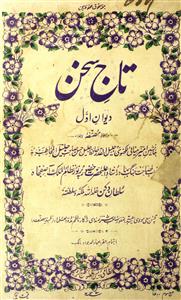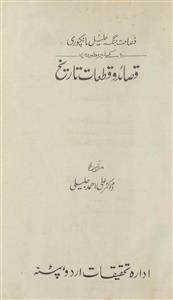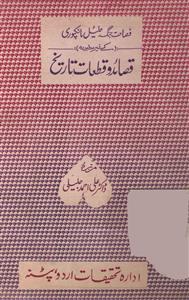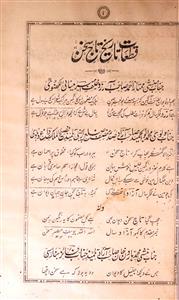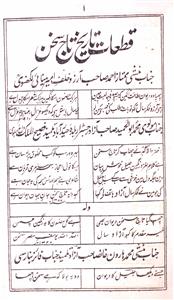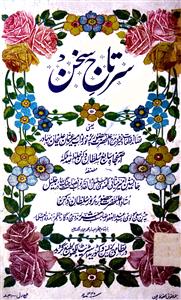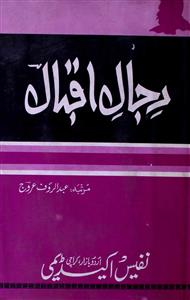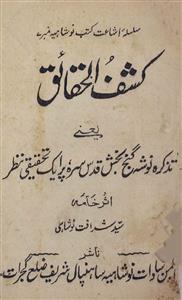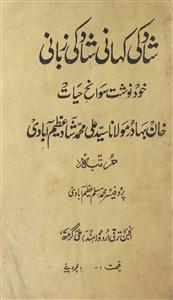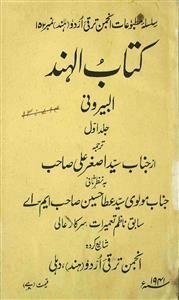 For any query/comment related to this ebook, please contact us at haidar.ali@rekhta.org
For any query/comment related to this ebook, please contact us at haidar.ali@rekhta.org
About The Author
Jalil Hassan was born in 1862 in the town of Manakpur (District Pratabgarh, Uttar Pradesh). His grandfather's name was Abdul Rahim and his father's name was Abdul Karim. It is not known when and where his ancestors came and settled in Manakpur. His ancestral home was in the Sultanpur neighborhood of Manakpur, in a mosque adjacent to which Hafiz Abdul Karim used to teach the Qur'an and theology to the children of the rulers and landlords of Manakpur. Jalil was the eldest son of Abdul Karim's wife Sania. They were all 9 brothers and sisters. Jalil received his early education in Manakpur from his father. At the age of twelve, he memorized the entire Qur'an. According to tradition, he continued to study Persian and Arabic sciences and arts and this process continued till the age of twenty. After that he came to Lucknow for further studies and entered the famous Madrasa Farangi Mahal. Jalil was a devout and had a medium stature, a slender body, a pale complexion and a downcast face. He wore an ancient Lucknow strap and wore a special black velvet hat, sherwani and Saleem Shahi shoes. He used to apply Kohl in his eyes and his lips used to be red due to drinking water.
He returned to Manakpur after learning Arabic-Persian grammar, logic and metaphysics (logic and other sciences) under the supervision of capable teachers like Maulana Abdul Haleem and Maulana Abdul Ali. Poetry was his passion from an early age which was further enhanced by the literary atmosphere of Lucknow. Manakpur itself had a good number of people of taste. Jalil's elder brother Hafiz Khalil Hassan Khalil was also a good poet. Staying in their company, Jalil also started reciting ghazals. Parents and family members never objected to his poetic activities. The two brothers also started participating in the poetry recitals of Raja Taish Hussain of Manakpur and were invited to the poetry recitals in the vicinity as their poems were liked. During his stay in Lucknow, Jalil was introduced to Amir Ahmed Minai. Jalil and Khalil wrote a joint petition to Amir Minai that they wanted to be his disciples. Amir Minai accepted the request. He was in Rampur in those days where the compilation of Amir-ul-Laghat was in progress. The correspondence with Jalil did not last long, but with great insistence Amir Minai summoned Jalil to Rampur and made him the trustee of Amir al-Lughat's manuscript.
His collections of words were published under the names of Taj-e-Sukhan, Jan-e-Sukhan and Rooh-e-Sukhan. Due to the companionship and mastery of the rulers and emperors, he had to use his poetic talents in a hurry. Therefore, a large part of Jalil's speech reflects the fluent nature and power of the word. Of course, one of the great features of Jalil's speech is that it is flawless. Nowhere is there a hindrance to common sense, difficulty or expression of gravity. The Jalil and Usman Ali Khan duo should be considered as the last link in the close relationship between the Hanroor poet and the eminent ruler that has been going on since the Abbasid rule of Muslims. Two years after Jalil's death, the Asif Jahi government was overthrown.
It was 1887. In Rampur there was a state of Nawab Hamid Ali Khan which was now a reference for poets as the centers of Delhi and then Lucknow were gone. This new literary confluence of Rampur was made up of schools in Delhi and Lucknow. In Rampur, for 17 years, Jalil had been receiving favors from Amir Minai. He had also entrusted Jalil with the task of correcting his pupil’s poetry in his old age. alil used to look after all matters related to Amir-ul-Lughat. The financial situation of Rampur was not good so the money allotted for Amir-ul- Lughat went into the office. To continue the work of the dictionary, the eyes of Amir Minai turned to the heads of state of Bhopal and Hyderabad. Jalil went to Bhopal for this work but it did not work out. In 1899, Nizam Saadis came to Calcutta. When he returned to Banaras, Amir Minai went to Banaras with Jalil to meet him. After returning, it was decided that if Amir Minai came to Hyderabad, it could be a job. o in 1900, Amir Minai arrived in Hyderabad with his sons and Jalil and became the guests of Hazrat Dagh Dehlavi who was the Ustad-e-Shah in those days. They rented a house nearby and started living there, but a few days in Amir Minai fell ill. Despite medical treatment, he died after 5 weeks of illness and was buried at Dargah Yusufin. And, as entrusted by Amir Minai himself, Jalil became the flag-bearer of his incomplete feats because he was the most distinguished of his worthy students.
Nizam Saadis died in 1911. In the same year, when the coronation of George V was celebrated in Delhi, Jalil also went to Delhi with Nizam VII Mir Usman Ali Khan, but nothing happened. After Dagh’s demise, Jalil was conferred the title of Ustad-e-Shah, in 1909, after a political hiatus of 9 years. After a long struggle, Jalil led a life of leisure and this continued for 35 years. At the end of his life, he started complaining of mental incapacitations and fits. Royal doctors and physicians treated but blood pressure complaints increased. Finally, after a two-day coma, he passed away on January 6, 1946, and was buried at Dargah Yusufin.
 For any query/comment related to this ebook, please contact us at haidar.ali@rekhta.org
For any query/comment related to this ebook, please contact us at haidar.ali@rekhta.org
